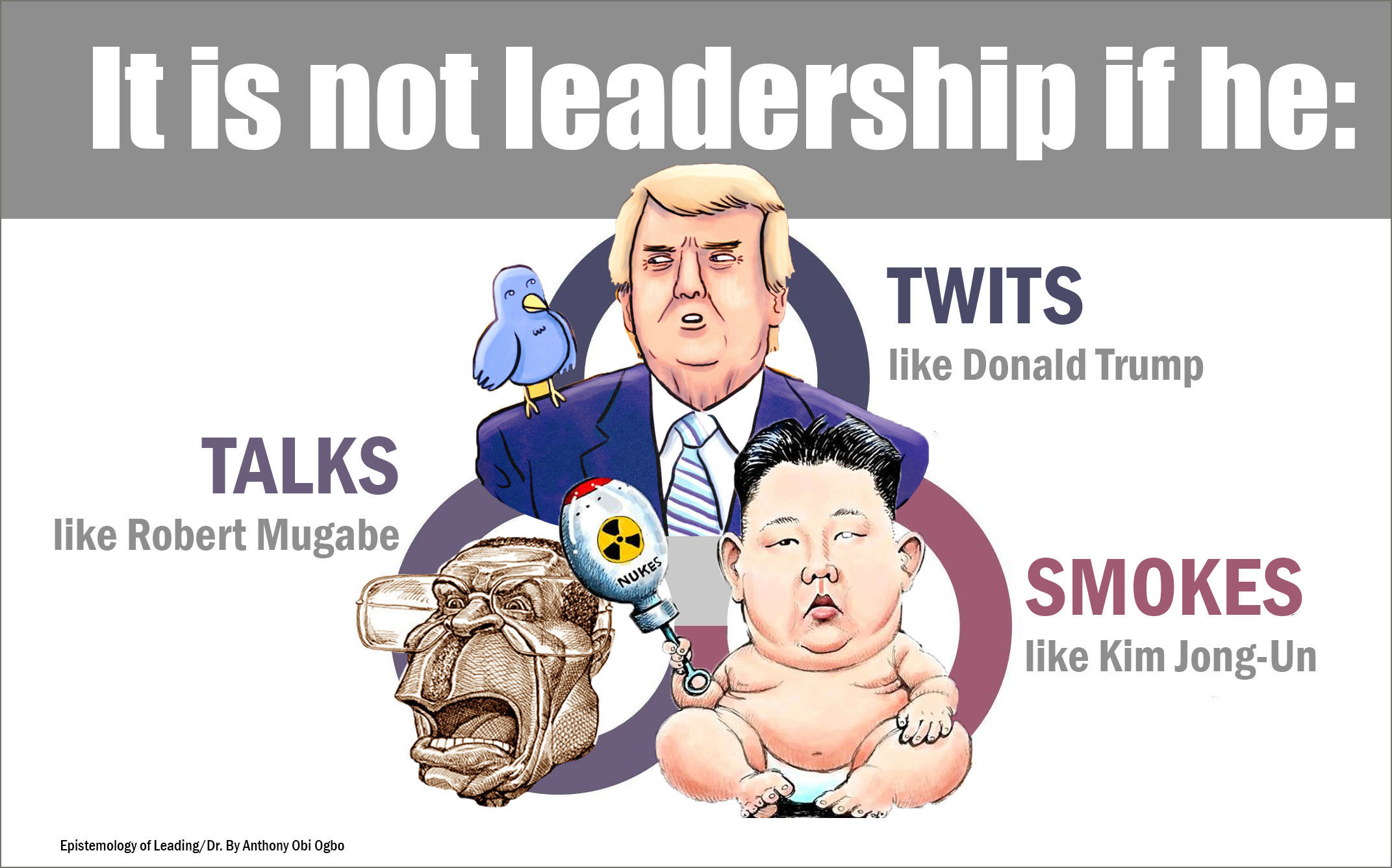Deconstructing the ontological meaning, interpretation, and application of leadership
By ANTHONY OBI OGBO
M.B.A., M.HM, P.hD.
With unimaginable measures of definitions, the sense and discipline of leadership and the act of leading still face ontological inadequacies. Authors, researchers, and theorists of leadership, for many years, have crafted their definitions from countless perspectives, justifying the conceptual relevance of each meaning with substantial phenomenological facts. In fact, most definitions are submerged in theoretical concepts of organizing people to manage their environment, politics, and resources; whereas the proper identification and deconstruction of practice insufficiencies gradually diminish out of consideration. For example, most definitions of leadership might end up investigating the epistemic standards of leading or managing success; but perhaps, to an extent, would least consider the very senseless trends leaders embrace at the detriment of their constituents. This essay, however, invokes the definition of leadership from the rearmost view by metaphorically invigorating significant theories and concepts to convey the meaning and application of leadership.
The article as a purpose, provides remedies to the disparaging afflictions of leading beyond the conjectural boundaries of organizing people, their hope, and aspiration. Passages in this article in explaining the process of leading or managing, offer substantial clues on how leaders or managers could harness their resources and translate their communal crisis into a plantation of economic possibilities. Consequently, in a shear reversal, rather than asking and explaining what leadership is or should be, the approach in this paper emerges from a backmost standpoint to ask and convey what leadership is not and should not be.
So let us proceed then with what leading is not, by first clarifying that leadership is not voodoo. It is not a ping-pong political affair, neither is it a fanfare business; it is a social science. In fact, in the broadest sense, the application of leadership must make sense. It must raise philosophical clarification in meaning and practice. It could be argued that the tradition of leadership must appeal a real-world epistemic connotation of organizational objectives, and implore execution actions. Nonetheless, if the exercise of leading does not breed tranquility of commonsense; ontological humility; if this process does not enthuse the spectacle of wisdom, where leaders learn from followers and followers learn from leaders; where leaders uplift followers and followers uplift leaders; or perhaps, where both camps walk side-by-side in solidarity over transcending challenges, it is not leadership
It might be acknowledged that effective leadership demands an integration of sociotechnical systems and tasks. Thus, if the process does not assume a driven expedition for innovation through a sociotechnical approach, whereby technological work procedures are incorporated with human emotions and actions, it is not leadership. It must be acknowledged that web applications are not humans but gadgets – thus leadership must not just focus on technical shortcuts to solving problems, but also could display a human face. Therefore, if the process is not strategized by intellectual actions; if the practice does not flow in-between the stakeholders of the organizations and the leadership; it is not leadership.
Consequently, if the practice does not share task-related thoughts; emit a learning culture, and instill a focus on both human attitude and information conveyance, it is far from leadership. Effective communication is a good process for managing attitude. Through open communication, leaders can amplify innovation by expediting, planning, goal-setting, exchange of information, and reduction of misunderstandings. Therefore, if the practice does not task the aptitude to listen, understand, sympathize, coach, and mentor; and furthermore, if the practice does not create a culture of transparency and information control to bond the leader and the led; it is not leadership.
Leadership is not a one-man process. Leaders do have subordinates, which conceivably are partners in the organizational development process. Isolating such cohorts in the decision process often leaves a structure of monocracy or tyranny. Therefore, if the leading process does not recognize subordinates as partners in business; and adopt them as allies in the change transformation venture, where the fundamental process of embracing something new implores a construction of sociopolitical awareness and shared collective interests, it is not leadership.
In quest of organizational transformation, amidst transcending global economic challenges, if activities do not entail the bone to take risks and facilitate innovative solutions to achieve unexpected outcomes, it is not leadership. This author in an approach to explore the content and discipline of organizational leadership in its entirety argues that the passion and basic skill set of leading might not be enough in making the organization great. A leader must be armed with the intellectual capacity to manage and motivate a culture of risk-taking. The audacity of leadership represents a scepter of human endurance, individual courage, and resolute idiosyncrasy. Therefore, if the process does not involve the propensity to tackle unparalleled trials of experimentation, potential threats and failure, it is not leadership.
It is appropriate to ensure that a broad enough human resources base must be allocated to innovation-related activities. As a part of organizational culture, tolerating failure makes organizations more innovative. In fact, people will not try to do new things if they know that they will be punished if they are unsuccessful. The process of taking risks must dovetail the fail-factor. In other words, a process that encourages risk-taking in the leading sector could reward failure as a learning tool. When leaders or managers dismiss such failures triggered by the risks of innovation with regulations and penalties, they are merely suppressing the passion to create something new. Therefore, if the organizational culture and structure do not create the standards for taking risks; if the system does not recognize the practical meaning of failure from the perspective of learning – it is far from leadership.
But the charismatic aspect of the act of leading is often played down, especially where a capitalistic quest for profitability engulfs human empathy. A leader must have a human face and exhibit compassion. If he does inspire empathy; that is, if he lacks the compassionate characteristics concomitant with the milk of human kindness[i] – if he does not resonate with the plights of the commonalities and share their traditional values and collective aspiration – the practice is far from leadership.
In a current era of social, political, and economic uncertainties, the language of leadership could build hope rather than fear; emit love rather than hate and animosity; orate peace rather than hatred; and accordingly, build unity rather than division. As Mahātmā Mohandas Gandhi noted[ii], “Service without humility is selfishness and egotism.” Therefore; if he talks like Robert Mugabe[iii]; twits like Trump[iv]; and parades the pitiless disposition of Kim Jong-un[v]; it is not leadership.
The values of the team aspect of leading or managing must be acknowledged too. Leadership success is a group phenomenon – and could entail an organized collaboration of individuals to accomplish tasks, solve problems, and collectively dissuade impending organizational or management challenges. Thus, if the process lacks the team atmosphere and signals unchallenged authority; or embraces the team setting but undermines its collaborative actions – it is not leadership.
The application of leadership must galvanize a culture of transformation, inspire the masses, and carry them along toward the finishing contours of mission accomplishment. As a leader or manager, it might not just be enough to oversee and appraise routine tasks and activities. It is the leader’s responsibility to supervise strategies for moving the organization from a present state to an upper level of economic possibilities. A leader must be able to speak the language of transformation with an accent pertinent to innovation and change structures. Therefore, and finally, if it does not speak the language of transformation; does not recognize the values of innovation; in other words, if it undermines the necessities of change and undercuts the technology of organizational reformation and progress, it is not leadership.
_________________________________
[i] Phrase ‘Milk of human kindness’ expressing care and compassion for others was derived from work of William Shakespeare’s Macbeth, 1605. Reference quote: “Yet doe I feare thy Nature, It is too full o’ th’ Milke of humane kindnesse.” (Shakespeare’s Macbeth, 1605).
[ii] Indian lawyer, politician, social activist, and writer Mahātmā Mohandas Karamchand Gandhi was the leader of the nationalist movement against the British rule of India.
[iii] Noted for controversial racist rhetoric, Zimbabwean revolutionary and politician, Robert Gabriel Mugabe served as Prime Minister of Zimbabwe from 1980 to 1987 and then as President from 1987 to 2017.
[iv] Donald John Trump is the 45th and current President of the United States, in office since January 20, 2017 whose addiction to Twitter could adversely reshape the presidency.
[v] Termed world’s foremost living dictator, Kim Jong-un is the Chairman of the Workers’ Party of Korea and supreme leader of North Korea since 2011. Under his rule, North Korea remains among the world’s most repressive countries.
_____________________________
About the Author
Dr. Anthony Obi Ogbo is the Publisher/Editor of International Guardian News in Houston, Texas; author of The Influence of Leadership, and the Strategic Advisor, Center of Excellence, Consumer Arts and Sciences at the Houston Community College. Profile: http://www.ajtlonline.org/dr.–anthony-obi-ogbo.html



Leave a Reply